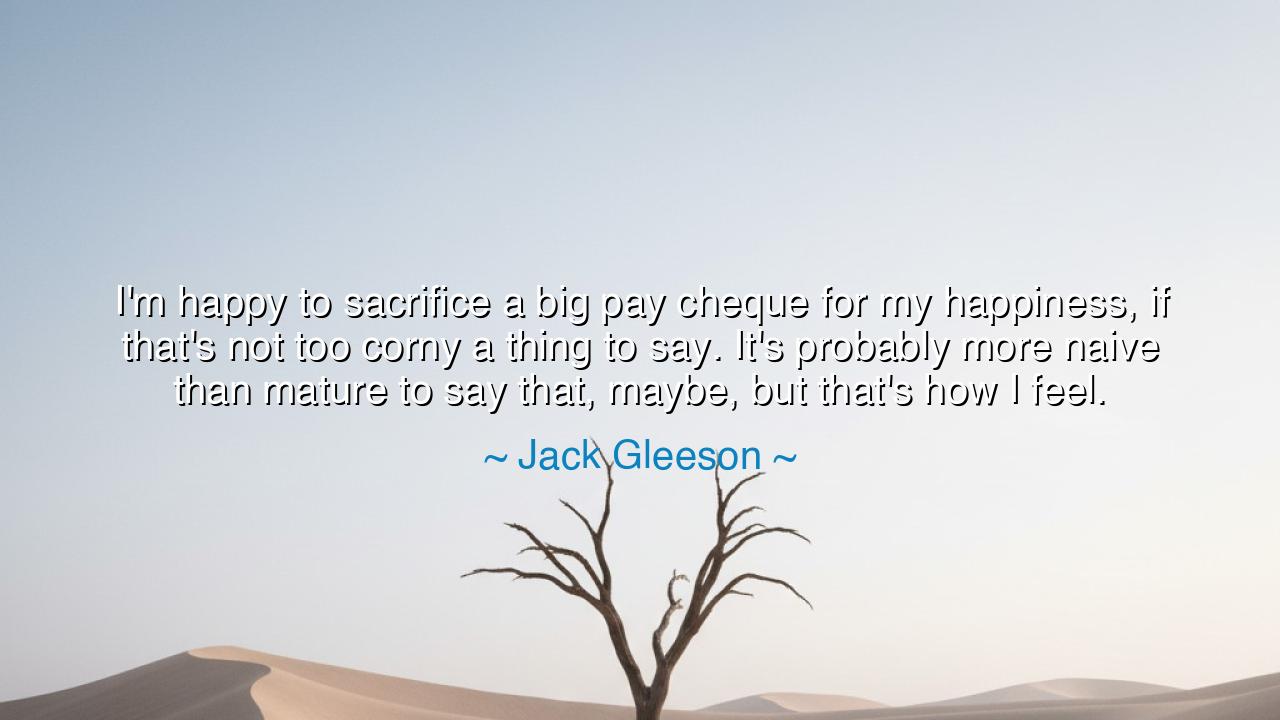
I'm happy to sacrifice a big pay cheque for my happiness, if
I'm happy to sacrifice a big pay cheque for my happiness, if that's not too corny a thing to say. It's probably more naive than mature to say that, maybe, but that's how I feel.






When Jack Gleeson said, “I’m happy to sacrifice a big pay cheque for my happiness, if that’s not too corny a thing to say. It’s probably more naive than mature to say that, maybe, but that’s how I feel,” he spoke not as a star, but as a philosopher in disguise. Beneath the humility and uncertainty of his words lies a truth as old as humanity itself: that wealth without peace is a gilded cage, and that happiness, though invisible, is the greatest treasure a person can ever possess. His words may sound modest, even hesitant, yet they carry the quiet bravery of one who has seen through illusion — the courage to choose meaning over money, and contentment over comfort.
In the ancient world, the wise often warned that gold has a strange power: it dazzles the eye but dims the soul. The poet Horace wrote that riches were like saltwater — the more one drinks, the thirstier one becomes. And the philosopher Epicurus, who lived in a humble garden outside Athens, taught that true joy is found not in luxury, but in simplicity. “If you wish to make a man happy,” he said, “add not to his wealth, but take away from his desires.” Gleeson’s confession echoes this timeless creed. Though he speaks from the modern world — a world of fame and fortune — his spirit belongs to the ancients, who knew that the heart’s peace is worth more than any crown.
Consider the story of Diogenes of Sinope, the beggar-philosopher who lived in a barrel. When Alexander the Great came to him and said, “Ask of me anything,” Diogenes simply replied, “Yes — stand out of my sunlight.” The mightiest ruler on earth stood before a man who owned nothing, and yet in that moment, it was clear who was truly free. Diogenes had nothing to lose and everything within himself to enjoy. He had discovered what Gleeson now reminds us: that freedom from excess is the beginning of happiness, and that the truest riches are found not in possession, but in peace.
To sacrifice wealth for joy is no small thing. It is to stand against the world’s current and to listen to the whisper of one’s own soul. Many chase after the illusion that happiness is bought — that a larger house or a brighter stage will fill the emptiness within. Yet the wise know that every purchase buys only a moment’s distraction. The deeper happiness — the kind Gleeson speaks of — comes from alignment: from living in harmony with one’s values, one’s nature, and one’s truth. This happiness cannot be sold, for it is the birthright of the sincere and the brave.
But notice also his humility — he calls his belief “naive.” How many times has the world mocked simplicity, calling it childish? And yet, often, it is the child who sees most clearly. The “naive” heart dares to believe that joy should not be traded away for success. It refuses the cynicism that corrodes the spirit. In that innocence lies strength, for only a soul uncorrupted by greed can still recognize what matters most. In this way, Gleeson’s words are not naive at all, but profoundly wise, though clothed in modesty.
The ancients would have praised such a view. The Stoic Seneca, himself a man of great wealth and influence, warned his students: “Money has never yet made anyone rich.” He meant that no sum could fill the vast emptiness of a restless heart. He urged instead a life of moderation, of purpose, and of gratitude. Likewise, Gleeson’s renunciation — his willingness to let go of what others covet — is an act of philosophical courage, a refusal to sell his spirit for the world’s applause. In this, he joins the lineage of those rare souls who measure success not by gain, but by peace.
So let this teaching settle into your heart: Happiness cannot be purchased, only cultivated. To live well is not to have much, but to need little. If you find that your pursuits rob you of rest, that your labor feeds your anxiety instead of your soul — pause, and ask yourself what you are truly buying. Sacrifice what is false for what is true, and the light of contentment will find you. Practice gratitude each day; seek simplicity; measure your worth not in currency, but in clarity.
For in the end, as Jack Gleeson understood, no pay cheque, no fame, no treasure of the earth can equal the wealth of a soul that is free and at peace. Let others chase the glittering wind; you, instead, build your house upon stillness. Choose your happiness over your pay cheque, your peace over your pride. And you will find that you have not lost anything at all — you have simply remembered who you were always meant to be.






AAdministratorAdministrator
Welcome, honored guests. Please leave a comment, we will respond soon